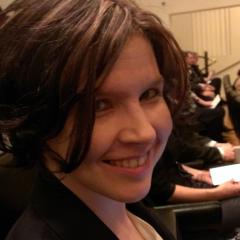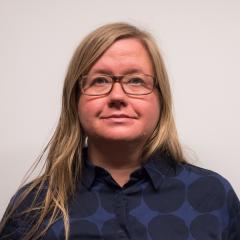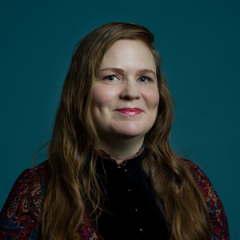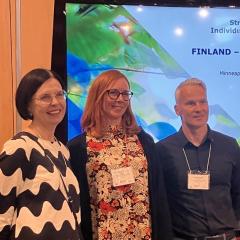

“My goal is to learn in the U.S. and return with new organizational ideas for creating more interdisciplinary learning environments in Finnish academia.”
This ambitious statement concluded my motivation letter, part of my ASLA-Fulbright Graduate Grant application, in 2012. During the Fulbright Award Ceremony and orientations, it was made clear to us grantees that our Fulbright goal is a mission to be taken seriously. Fulbrighters are expected to become changemakers, using the knowledge and global connections gained during our grant period to foster meaningful change as alumni. With this in mind, I started my Fulbright journey.
Eight years later in 2020, I came across my old Fulbright grant application. As I read it, an uncomfortable question took over my mind: Have I met my Fulbright goal? Or have I failed to make meaningful change as I had intended?
Know-how and new ideas gained during the Fulbright Finland term
The Fulbright program certainly provided me with know-how needed to meet my goal. My Fulbright grant took me to New York University, a fantastic opportunity for learning about integration and communication of ideas across fields. I participated actively in Fulbright enrichment programs, which were a perfect example of how people with diverse backgrounds can come together and engage in fruitful dialogue. I was full of enthusiasm, ready to build new bridges in my research environment back home.
But as I returned to Finland, I was greeted by harsh realities. Rather than managing to bring people from different fields to the same table, they continued to work separately, insisting that my ideas about dialogue across spheres in the U.S. were too different from how things had always been done here. I was also told that as an early-career scholar, I shouldn’t be concerned about transforming the university - I should limit my focus to my own research. But what about my Fulbright goal? I felt miserable and alone with my ambitious ideas.
I remained active as an alumna in the Finnish Fulbright community, seeking to maintain my energy and inspiration in this fruitful environment. Whenever I attended an event, I would learn about accomplishments by other alumni: a new fancy title, an award for ground-breaking artistic work, an innovation that helped solve a significant problem in our society. Seeing the success of other alumni was an empowering experience, something that filled me with hope, time and again.
But it also started to feel as though other alumni were always thriving, while I just kept hitting my head on the wall.
When signing up for Fulbright events, the sign-up forms request our title and institutional affiliation. At times, I did not know what to fill in, as my prestigious grants were followed by short-term teaching contracts, non-academic positions and desperate moments of unemployment. I was collapsing in a gap between the very fields that I had intended but failed to unite as my Fulbright goal. I started to feel that I did not even deserve to be a Fulbright alumna, beginning to withdraw from this community I loved so much.
My feelings of inferiority and failure certainly did not originate with the Fulbright Finland Foundation. Quite the contrary, I have found it exceptionally easy to openly share my struggles with CEO Terhi Mölsä, Senior Program manager Karoliina Kokko, and other members of the Fulbright Finland staff. Instead, I argue that the feelings of shame arise from academia and society at large. Academia is regarded as a meritocracy that rewards the smartest and most talented. Fulbrighters are expected to be among the most prominent in the group of those selected individuals that succeed in the fierce competition for academic funding and jobs.
Failure is part of creative work
According to Martin (2012), “Failure is something we are conditioned to avoid from a young age. Failure triggers the fear of being ostracized and the shame of not being “good enough.’ Failure is seen as a personal or organizational flaw that indicates a lack of competence and worthiness.” Indeed, failure seems to be the complete opposite of what the Fulbright program brings to mind. We are not used to seeing the words “Failure” and Fulbright” in the same context.
And yet, it is often forgotten that failure is an inevitable part of creative work. BinBin Pearce (2020) observes that failure occurs on a spectrum from blameworthy to productive/praiseworthy. According to Pearce, “blameworthy failures are avoidable. They can result from violating a prescribed procedure, inattention to detail, or a lack of ability of following a procedure. Praiseworthy failures are unavoidable. They result from carrying out a task that is inherently challenging, dealing with unexpected and emerging properties of complex systems, having to make decisions and carry out actions with limited information about future events and intentionally experimenting to test an idea or to expand knowledge and break new ground.”
Fulbrighters often focus on complex problems, such as climate change, global inequality - or the COVID-19 pandemic. Therefore, it can be assumed that productive failure, in fact, is a very common experience among Fulbrighters.
Open dialogue with the alumni community
Through open communication with other Fulbright alumni, I have begun to realize that indeed, struggles are more common than they may seem to be. I was especially surprised to find that even those alumni who always seem to be thriving have faced challenges very similar to those of my own. Among such colleagues is Dr. Heikki Saxén, whose Fulbright grants took him to the prestigious Harvard T. H. Chan School of Public Health. Currently, Heikki is Chairman of the Finnish Institute of Bioethics and recipient of numerous awards such as the UNESCO Prize for advancing bioethics in Finland.
“Bioethics is a new field in Finland, very much situated in-between established fields and disciplines. Bringing influences from the U.S. to advance the field of bioethics in Finland has involved many challenges in this regard. Becoming a Fulbrighter elevates expectations, and is often followed by moments of despair when we feel that we cannot meet those high expectations. I believe that most of us grantees and alumni have grappled with issues like this, even if we have not brought them up in our discussions,” Heikki observes.
"We, as alumni, need to be able to share our struggles and failures with each other and the Fulbright community at large, openly and without feelings of inferiority or shame."
This leads me to the main point of this blog post: We, as alumni, need to be able to share our struggles and failures with each other and the Fulbright community at large, openly and without feelings of inferiority or shame. If we jointly recognize failure as “acceptable” for Fulbrighters, alumni can feel more encouraged to try out new and risky ideas, potentially leading to more ground-breaking innovations.
During COVID-19, our economies have suffered in unprecedented ways, with physical campuses closing and thousands of losing their jobs all over the world. One of the most important values addressed in Fulbright Finland virtual seminars, organized amidst the pandemic, is resilience. As Fulbright alumni, it is more crucial than ever to be able to create and maintain an environment where we are able to be empathetic towards fellow alumni who are struggling.
While embracing difficult times as something natural that cannot be avoided, we must also be careful to not use “productive failure” as an excuse to fall short of our original ambitious aims. As expressed by Pearce, “productive failure as a learning design does not mean embracing avoidable failures and lowering standards for excellence. Instead, it involves increasing the acceptability of unavoidable failures.”
"Our Fulbright changemaking goal is a life-long commitment."
Back to my original Fulbright application and question: Did I meet my goal or did I fail to make meaningful change?
By now, I have learned that our Fulbright changemaking goal is a life-long commitment. What matters most is how hard we try, how resilient we are, and how we treat other people in that process - not how fast we land in a position that sounds like we successfully met our goal. Even as we do meet our goal, we should keep pushing ourselves, to expand and connect our original goal with the new complex challenges of our times. And in this endeavor, we truly need each other.
Sources cited in this text:
Martin, A.J. 2012. Fear of failure in learning. In: N.M. Seel, ed. Encyclopedia of the sciences of learning. Boston, MA: Springer.
Pearce, B. 2020. Learning from fail forwards: Operationalizing productive failure for tackling complex environmental problems. In D. Fam & O’Rourke (Eds.), Learning through failure in interdisciplinary and transdisciplinary projects. Springer.



